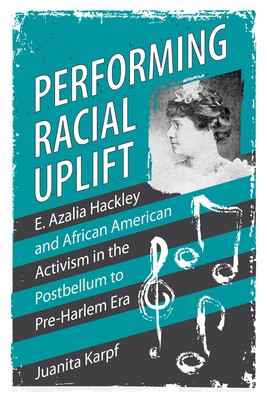
- We will send in 10–14 business days.
- Author: Juanita Karpf
- Publisher: University Press of Mississippi
- ISBN-10: 1496836790
- ISBN-13: 9781496836793
- Format: 15.2 x 22.9 x 1.4 cm, softcover
- Language: English
- SAVE -10% with code: EXTRA
Reviews
Description
In Performing Racial Uplift: E. Azalia Hackley and African American Activism in the Postbellum to Pre-Harlem Era, Juanita Karpf rediscovers the career of Black activist E. Azalia Hackley (1867-1922), a concert artist, nationally famous music teacher, and charismatic lecturer. Growing up in Black Detroit, she began touring as a pianist and soprano soloist while only in her teens. By the late 1910s, she had toured coast-to-coast, earning glowing reviews. Her concert repertoire consisted of an innovative blend of spirituals, popular ballads, virtuosic showstoppers, and classical pieces. She also taught music while on tour and visited several hundred Black schools, churches, and communities during her career. She traveled overseas and, in London and Paris, studied singing with William Shakespeare and Jean de Reszke--two of the classical music world's most renowned teachers.
Her acceptance into these famous studios confirmed her extraordinary musicianship, a "first" for an African American singer. She founded the Normal Vocal Institute in Chicago, the first music school founded by a Black performer to offer teacher training to aspiring African American musicians. Hackley's activist philosophy was unique. Unlike most activists of her era, she did not align herself unequivocally with either Booker T. Washington or W. E. B. Du Bois. Instead, she created her own mediatory philosophical approach. To carry out her agenda, she harnessed such strategies as giving music lessons to large audiences and delivering lectures on the ecumenical religious movement known as New Thought. In this book, Karpf reclaims Hackley's legacy and details the talent, energy, determination, and unprecedented worldview she brought to the cause of racial uplift.EXTRA 10 % discount with code: EXTRA
The promotion ends in 19d.18:06:12
The discount code is valid when purchasing from 10 €. Discounts do not stack.
- Author: Juanita Karpf
- Publisher: University Press of Mississippi
- ISBN-10: 1496836790
- ISBN-13: 9781496836793
- Format: 15.2 x 22.9 x 1.4 cm, softcover
- Language: English English
In Performing Racial Uplift: E. Azalia Hackley and African American Activism in the Postbellum to Pre-Harlem Era, Juanita Karpf rediscovers the career of Black activist E. Azalia Hackley (1867-1922), a concert artist, nationally famous music teacher, and charismatic lecturer. Growing up in Black Detroit, she began touring as a pianist and soprano soloist while only in her teens. By the late 1910s, she had toured coast-to-coast, earning glowing reviews. Her concert repertoire consisted of an innovative blend of spirituals, popular ballads, virtuosic showstoppers, and classical pieces. She also taught music while on tour and visited several hundred Black schools, churches, and communities during her career. She traveled overseas and, in London and Paris, studied singing with William Shakespeare and Jean de Reszke--two of the classical music world's most renowned teachers.
Her acceptance into these famous studios confirmed her extraordinary musicianship, a "first" for an African American singer. She founded the Normal Vocal Institute in Chicago, the first music school founded by a Black performer to offer teacher training to aspiring African American musicians. Hackley's activist philosophy was unique. Unlike most activists of her era, she did not align herself unequivocally with either Booker T. Washington or W. E. B. Du Bois. Instead, she created her own mediatory philosophical approach. To carry out her agenda, she harnessed such strategies as giving music lessons to large audiences and delivering lectures on the ecumenical religious movement known as New Thought. In this book, Karpf reclaims Hackley's legacy and details the talent, energy, determination, and unprecedented worldview she brought to the cause of racial uplift.

Reviews